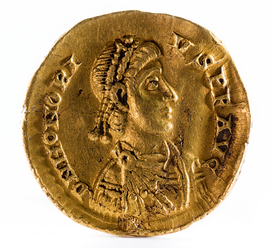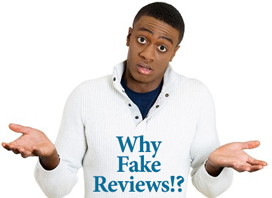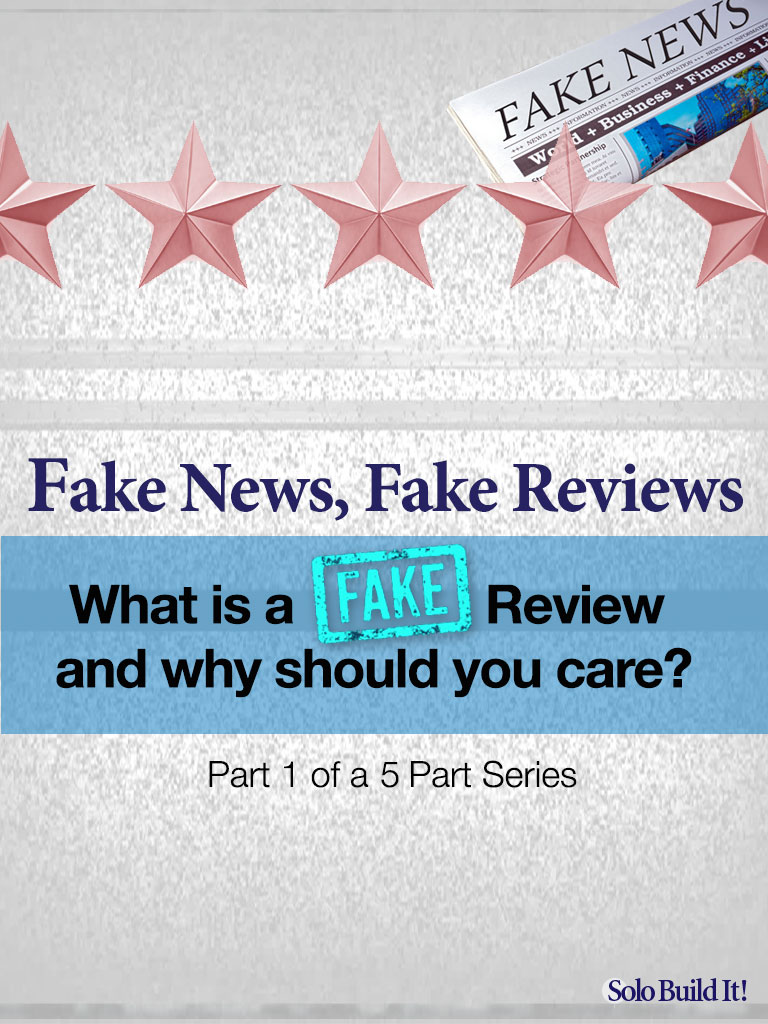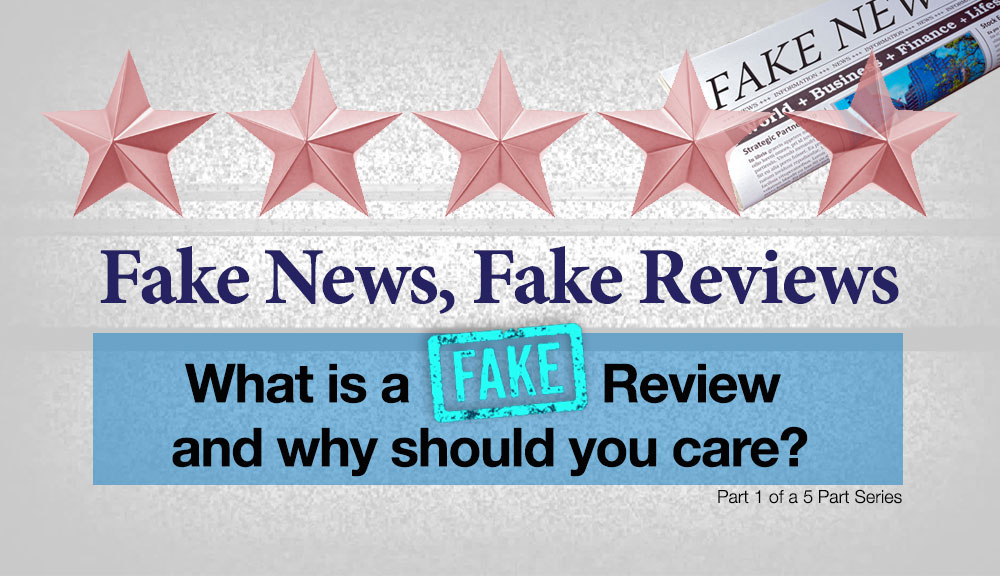The 5 Parts: Fake Reviews
Part 1: What is a Fake Review, and Why Should You Care? (You are here)
Part 2: Peeling Away The Dark Side Of Internet Marketing
Part 3: Spot ’em and Stop ’em!
Part 4: Tired of Fake Reviews? Let’s Steer a Different Path!
Part 5: Beat the Fake – How to Gather Authentic Reviews for Your Business
It All Began in the Year 44 B.C.
… when Julius Caesar’s death left the door open for a power struggle between two potential successors: Octavian, the boring, untalented son, and Mark Antony, a charismatic man with a natural aptitude for leadership.
It wasn’t looking good for Octavian. Until, that is, he hit upon a way of lessening Antony’s power: he started a smear campaign.
 Being without social media, Octavian released a series of coins engraved with what we’d now call “soundbites”, “exposing” Antony as a debauched womanizer who would sell the Empire to a foreign political power in the shape of Cleopatra. He followed it up with a book — probably threw in a couple of speeches, too.
Being without social media, Octavian released a series of coins engraved with what we’d now call “soundbites”, “exposing” Antony as a debauched womanizer who would sell the Empire to a foreign political power in the shape of Cleopatra. He followed it up with a book — probably threw in a couple of speeches, too.
The rest, as they say, is history. Concerns about traditional Roman values escalated; Antony was vilified as a traitor — without any evidence — and the next Emperor was — you guessed it — Octavian.
The first historically recorded example of “fake news.”
Fast Forward a Few Hundred Years…
… and the term “fake news” is pretty well known to all of us. Broadly speaking, it’s the struggle between truth and power, in exactly the same way it was in 44 B.C.
But what about the term “fake reviews”? Not so well known, it’s nevertheless true that most of us will have experienced them at some point — although we may not necessarily have realized it at the time.
What Exactly Is a Fake Review?
 Ever seen an e-book with dozens of glowing reviews, only to buy it and discover spelling mistakes, no plot and writing so far beyond appalling that you can’t carry on beyond the first page?
Ever seen an e-book with dozens of glowing reviews, only to buy it and discover spelling mistakes, no plot and writing so far beyond appalling that you can’t carry on beyond the first page?
Either everyone who reviewed it knows something you don’t about how to write coherently, or what you’ve just experienced is a raft of fake reviews.
They’re reviews which are designed specifically to give a false impression to consumers on the point of purchasing.
They don’t accurately reflect the product or service they’re talking about because they are designed to go after your wallet in the same way as “fake news” aims to dupe your thought processes.
You’ll see both positive and negative fake reviews.
“Fake positives” are the glowing reports that bear no resemblance to reality. The e-book example above. The hotel you book only to find its “spacious bedrooms” mean you don’t have room to unpack your suitcase and its “beachside location” has an inter-city train line running between it and the beach.
Positive fake reviews are written to compel you to take action — i.e. to buy the product or service.
“Fake negatives” are those that persuade you not to eat at a certain restaurant because it’s “known to have cockroaches in the kitchen” or not to go to a particular counsellor because “she ruined my life forever.”
Negative fake reviews are written to persuade you not to take action on the product being reviewed. They are written to damage one company’s reputation and generally go on to recommend a different product from a competitor.
Neither positive nor negative fake reviews are based on reality. At best, they’re based on shared misunderstanding; at worst, outright lies.
Why Does it Matter?
A positive reputation is one of the most powerful marketing assets a business has to convince new customers to contact them. The social proof contained within reviews and star ratings helps consumers short cut their research and make decisions faster and with greater confidence than ever before.Bright Local, Consumer Review Survey 2016
Reading reviews has been called: “One of the final stages of the purchase path.” (1)
Why? Because by the time a consumer has reached the point of reading reviews, she has already decided she has a need or a desire for that product. She’s now looking for positive signals to help choose the best product to match her need.
And both positive and negative information have been shown to affect the decision-making process directly (2).
Online endorsements are known to be key in the decision-making process. America’s Federal Trade Commission found that over 70% of consumers read product reviews before buying (3). In a 2016 survey, as many as 84% said they trust an online review as much as they would trust a personal recommendation from a friend (4) – a rise from 80% in 2015.
And 72% will take some kind of action after having read a positive review.
So whatever the product — whether it’s a face cream or a Ferrari, a diet pill or a designer dress, a hotel or a hosting service — and whether it’s a positive or a negative review, it will have an impact on whether or not the prospective customer becomes an actual purchaser.
Why Would Anyone Write a Fake Review?
 There are a mixture of reasons.
There are a mixture of reasons.
Emotion can be a strong trigger:
-
You’re a bellhop at a well known hotel. You’re fired because you were caught smoking on duty. You’re furious – how will you ever find work now?
So you go online and write an entirely negative review of the hotel under an assumed name, warning guests to stay away. That will show them!
Competition is another:
-
Your seafood restaurant is doing badly compared to your competitor two blocks away. You’ve never eaten there but you can’t afford for him to have the edge.
You write a review saying you’ve eaten there. The fish stank! The waiters were rude! You would not take your worst enemy there!
Intellectual laziness is another:
But the strongest reason for people writing fake reviews is financial.
Fake reviews are most often written for financial gain. They can be provided by:
-
People who are hired to write them for money. A simple Google search for “write fake reviews” exposed this article from a fake reviewer who says — without any hint of a conscience:
So you want to start a career by ruining the internet for everybody else. That’s fine… In short, you need to build up some trust before you betray it for cash.
-
People acting as “proxies.” These are individuals employed by a company who write reviews for that company by hiding their online identity. Trip Advisor has many examples of this. Indeed, this article shows individuals exactly how it’s done, and then says:
That’s it, it doesn’t get easier than this. As mentioned, TripAdvisor has ZERO validation for new member sign ups. Just change your IP and you are on your way.
-
Affiliates. Individuals who stand to gain if someone buys the product they’re reviewing. These are often full web page reviews, written whether or not the person believes in the product because they earn a percentage commission from the company for each product or service they sell.
Internet marketing is particularly prone to this, as are “health” recommendations, because there’s a greater knowledge imbalance: the affiliate generally knows much more about the subject than the purchaser. It’s easier to overwhelm someone with details and jargon if they have little knowledge of the subject.
As this article says: “If you’re researching pretty much any internet marketing training product, odds are you can find a TON of fake positive reviews for it. If you search pretty much any keyword, you find videos and pages upon pages of search results ranting and raving about how wonderful it is — even for the worst products you’ve purchased in your life.”
Let’s take a closer look at how the two most pervasive fake review practices set out to deceive.
Fake Reviews: Platforms
These are the review sites of which we’ve all had experience: Amazon, Trip Advisor, Yelp and Glass Door, for example.
Reviews here are generated by millions of users. While no single review is likely to be definitive for a 3* Trip Advisor-rated hotel in Milan, for example, the “wisdom of crowds” tends to bubble the best to the top.
Consumers now use these platforms for almost every imaginable purchase decision. If they weed out fake reviews, they can be immensely useful. They can help you find everything from the best luxury hotel in the Carlton district of Melbourne, Australia to a dentist near Hyde Park in London.
Review platforms can, though, be corrupted by elaborate campaigns of fake reviews that either promote or denigrate, as explained in this article in The Telegraph. And this NYTimes story tells how one pizzeria became so sick of all the gaming at Yelp, he tried to be the worst pizza in the San Francisco area — and business boomed!
Platforms like these have become increasingly aware that purchasers’ bad experiences can quickly erode their credibility. So it’s in their best interests to develop algorithms which monitor, detect and delete the gaming of their sites by fake reviews.
In short, the review platforms auto-regulate. Some fakes still find a gap in the system but generally, the platform with the most robust anti-gaming algorithm wins.
Fake Reviews: Individual
Individual, authoritative reviews can be highly valuable. A comprehensive review by a trusted business or solopreneur can transmit the entire product experience in a single, deep, expert article.
The astute solopreneur does not “sell out,” writing a glowing article about a poor product, because she knows it’s wiser to think long-term.
For example, it would be very bad business to write a strong review that recommends a poor villa in Anguilla, run by an ill-tempered owner who is willing to pay a lot to recommend it.
There’s short-term financial gain, sure. But those stories go to TripAdvisor and her reputation ends up in tatters.
Sadly, though, the unethical solopreneur who cares only about the quick buck will happily ruin several family vacations for a few thousand dollars.
Maintaining a credible long-term, niche-based content site that builds ethical income and high equity would be impossible to sustain on that basis.
Which brings us to…
Fake Reviews: Affiliate Schemes
Most consumers dislike a company which makes negative claims directly against a competitor, known as “negative marketing.”
With that in mind, some companies get round this by encouraging their affiliates to write reviews on other products.
Here’s how it works: company “A” would…
- Convince their affiliates, often by a simple process of repetition, that their company is the best of its kind — whether or not it is.
- Encourage their affiliates to write a review of a competing product belonging to company “B” — whether or not the affiliate has knowledge of Company “B”‘s product.
- Make sure the affiliates understand that their review, whether it’s positive or not, must end with a recommendation for company “A”‘s product.
- If the review of Company “B”‘s product is based on actual usage that reflects an impartial and complete review of the product, if the claim of superiority is supported by evidence, and if – in other words, if the affiliate serves the searcher with the honest review that was expected; and if the affiliate makes it clear that she is an affiliate and therefore makes a commission from selling company “A”‘s product, there’s no problem. The affiliate wins appreciation by referring the visitor to a superior product and everyone is happy.
- But if Product “B” has never actually been tried, if the claim of superiority is not supported by evidence, and if the affiliate of company “A” does not make clear that she is selling an affiliate product and earns commission, it’s fake.
- Why? Because there is no evidence of superiority. The review is there purely to earn money. The person buying the product is given mis-information and is likely to buy an inferior product which will not match their needs.
- Legislation on this is clear. The purchaser is entitled to expect honest editorial content, not commission-paying sales material.
Let’s look at how this works at a practical level.
- Angela, who is searching for a reputable counsellor following a distressing assault, has heard of “Saintly Counselling”, so searches for “Saintly Counselling reviews.”
- She finds multiple fake negative reviews, written by affiliates for “Devil May Care Counselling” who get paid for every client they introduce.
- She doesn’t know they’re fake. It wasn’t completely obvious: one said “Saintly” destroyed her life forever, one said it was “Meh” and one said it had some good points.
- Each of them ended their review with a recommendation for “Devil May Care,” calling it the most effective counselling in the world — even though they had never experienced it.
- Angela clicks on the affiliate link and books an appointment with “Devil May Care.”
- “Devil May Care” get the counselling fee, of which they give a percentage to the affiliate on whose link Angela clicked through.
- Of course some part of each review is fake, but the biggest fake point is the recommendation of “Devils”‘s superiority.
- In all cases, the company and the affiliate, with the complicity of the company, gain financially at the consumer’s expense.
But there’s more to it than that, even. Because Angela is not only defrauded, she may also suffer immense hardship. Poor counselling can lead to catastrophic damage.
The same principle applies to any product, even though it may not have the same ruinous results. But picking the wrong dentist may result in an expensive, incompetent root canal that you didn’t need; selecting a bad hotel will ruin your vacation.
A Real Life Example
Wealthy Affiliate (WA) has thousands of affiliates who are trained to write reviews about competing products, including Solo Build It! (SBI!), its closest rival. Regardless of the actual content of the reviews, all WA reviews recommend WA as the superior product.
 SBI! performed a comprehensive study which conclusively proved the opposite of those claims. It provided the methodology so that anyone can reproduce it.
SBI! performed a comprehensive study which conclusively proved the opposite of those claims. It provided the methodology so that anyone can reproduce it.
The results showed conclusively that SBI! is 33X more likely to enable the solopreneur to build a high-traffic site.
It’s a risky business, encouraging negative reviews. It opens the prospect of the company, in this case WA, losing substantial credibility with…
- its customers who believed the claim
- its affiliates who recommended it as a service to visitors, believing the reassurance of the company.
And quite apart from the loss of credibility and reputation, the following are also possible…
- class-action by the company’s affiliates if they were misled into recommending
- class-action by failing customers if they believed affiliates
- fraud charges from consumer and government groups
- lawsuits from the damaged company for defamation, tortious interference, and so on.
“7.1 Your Indemnification. You shall defend, indemnify, and hold harmless Wealthy Affiliate, its affiliates, directors, officers, employees, and agents from and against all claims, losses, damages, penalties, liability, and costs, including reasonable attorneys’ fees, of any kind or nature which are in connection with or arising out of a claim (a) alleging that the Customer Content or your use of the Services infringes or violates the intellectual property rights, privacy rights, or other rights of a third party or violates applicable law; (b) relating to, or arising from, Customer Content, or your breach of Section 2.3 or Section 2.6; or (c) relating to, or arising from, Third-Party Services.”
Those 3 words, “violates applicable law,” means that YOU, and only you are legally responsible for your reviews. The reference to 2.3 means that you are responsible for the “legality of Customer Content.” There’s a whole lot more in 2.3 that leaves you totally exposed. That clause even means that YOU will have to pay to defend WA if they are sued and your review is mentioned.
Grey Areas: Are Reviews of Reviews Fake?
The European Parliamentary Research Service defines the content of fake review as follows…
A fake review can be defined as a positive, neutral or negative review that is not an actual consumer’s honest and impartial opinion or that does not reflect a consumer’s genuine experience of a product, service or business.
 It may be difficult or impossible to experience some products before writing a review recommending them. If your niche is the island of Sicily, for example, it won’t be possible for you to stay in every hotel on the island (unless you’re very lucky and very rich!).
It may be difficult or impossible to experience some products before writing a review recommending them. If your niche is the island of Sicily, for example, it won’t be possible for you to stay in every hotel on the island (unless you’re very lucky and very rich!).
Such subjects require credible research of objective data, and wide coverage of the subjective experience of others. Original research such as a survey, if properly conducted, adds to the value of such coverage.
This type of “review” should present as balanced a picture as possible.
A review not based on personal experience, even when carefully researched, crosses into a “grey” area. The key to whether it’s a fake review or not is intent.
- When performed rigorously and in a balanced way that honestly tries to reflect the truth, this type of “review” can be valuable to the reader.
- But if it has an agenda to mislead, it would be considered a “fake review” for the purposes of this article.
- The review should clearly identify that it is based only on research, that you have not personally used the product in the manner that a typical consumer would.
Included in this kind of “researched review” is the “review of reviews” category. Here too, the onus is on the author to thoroughly assess each review for accuracy and to present a balanced picture.
This type of review becomes “fake” if it…
- is passed off as personal experience
- knowingly includes fake reviews (or if it should have known)
- intentionally fails to be a thorough and objective reflection of the user experience
- indulges in practices such as seeking out others who have had a negative experience. A few angry ex-customers (or ex-employees) can unite to create a powerful, but inaccurate picture that fails accurately to represent the views of the much larger general user base.
Fake Reviews Are Neither Fair nor Just…
Readers who find a review via an online search are entitled to expect an accurate reflection of a user’s experience, written by that user. In a perfect world, a true review would accurately and fully fulfill that search intent.
But fake reviews are not, in fact, reviews. They are actually sales pages disguised as reviews.
If you sense that this borderlines on fraud, so does Amazon which has suffered from fake reviews for several years:
Since the beginning of 2015, the company has filed lawsuits against more than 1,000 people in relation to this issue, taking on both those who offer to sell fake reviews as well as those who buy them.
(5)
The US Federal Trade Commission and consumer protection groups are increasingly interested in stopping this rampant practice with lawsuits. And it’s not just an issue in the US:
“International collaboration is increasingly important for enforcement agencies combating deceptive practices online.” (6)
Following the FTC’s lead, it’s very likely that more class action by other, smaller companies will follow.
Conclusions
Fake reviews can be a short-term, high-yield strategy. But they are potentially illegal and morally reprehensible.
Where large amounts of money are to be gained or lost, fraud will almost inevitably follow. And since reviews of a product are the closest thing to purchase intent, it is for some the opportunistic vehicle of choice to rank high at search engines and, using deceptive methods, alter choice for the consumer.
Teams of well-trained affiliates can certainly create and maintain the illusion of truth over a period of time. Ultimately the truth will out, but until then they will happily do their visitors a disservice in return for juicy commissions.
Marketing an inferior product through fake reviews should be ruled out on moral grounds. It’s simply not principled knowingly to sell an inferior product to a customer.
For some, though, principles are unimportant in the rush to make money. In those cases the risk of legal action may be the only thing that stops them. Care for the customer is starting to motivate honorable companies to follow that path.
Behaving ethically may be a slower road to success. But ultimately, it’s the right road. You may earn less money by giving the best product the best review, but the road to long-term online success is by OVERdelivering high-value content to your visitor.
Continue reading this series on fake reviews and you’ll discover how and why a business based on fake reviews can suddenly crash to zero, even without any legal action against you.
The 5 Parts: Fake Reviews
Part 1: What is a Fake Review, and Why Should You Care? (You are here)
Part 2: Peeling Away The Dark Side Of Internet Marketing
Part 3: Spot ’em and Stop ’em!
Part 4: Tired of Fake Reviews? Let’s Steer a Different Path!
Part 5: Beat the Fake – How to Gather Authentic Reviews for Your Business

Latest posts by Ken Evoy (CEO, SiteSell) (see all)
- Understanding the 3 Phases of Search: A Guide for Website Owners - April 10, 2025
- Large Language Models: What Content Creators Need to Know - March 13, 2025
- Beyond the Helpful Content Update: The Real Lessons Google Is Teaching Us About the Future of Search - February 19, 2025


